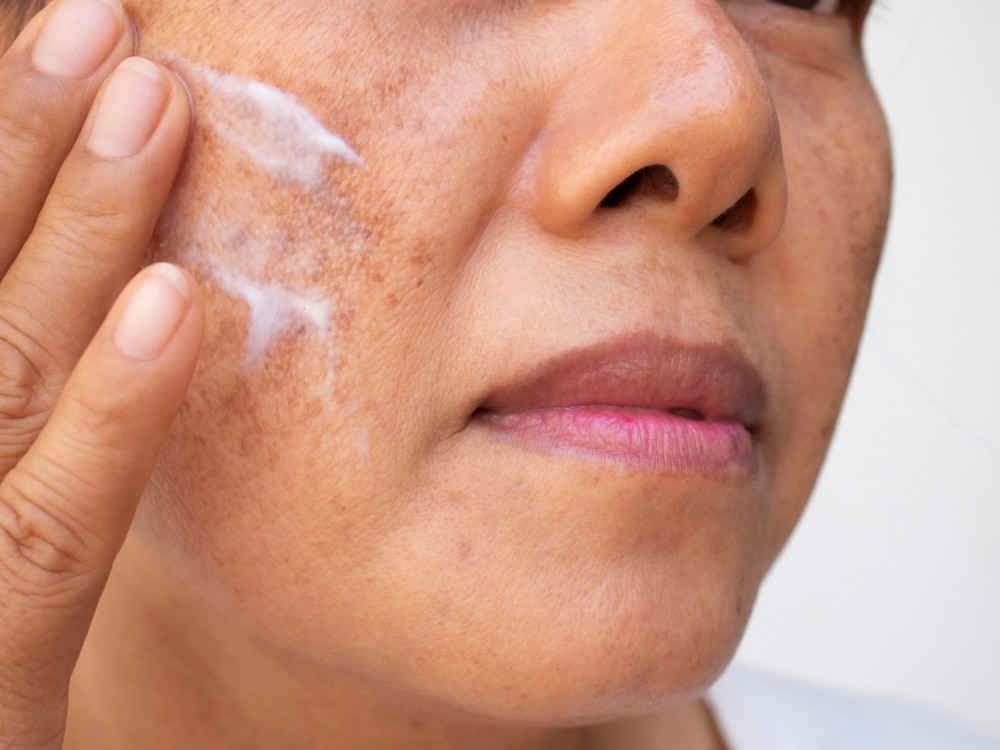The dark spots that surface on your skin—sometimes after a blemish, but sometimes seemingly out of nowhere—can be frustrating to say the least. These darkened areas are called hyperpigmentation, and they can affect anyone at any time. But how long does it take for hyperpigmentation to fade?
The answer to this question can vary from person to person, but fortunately, there are things you can do to help. Read on to learn what might be holding you back from making the best progress toward fading those pesky patches.
What Causes Hyperpigmentation?
Hyperpigmentation is the overproduction of melanin, which is the substance your body produces to make the color of your skin, eyes, and hair. Your body may overproduce melanin due to a number of causes, which may be internal or external.
An example of an internal cause of hyperpigmentation is taking birth control pills, which can cause melasma, a skin condition defined by patches of dark spots. A report in the journal Acta Dermato-Venereologica explains that 25 percent of women developed melasma after starting an oral contraceptive. External causes of hyperpigmentation include inflammation and trauma to the skin, like squeezing a pimple or scratching at eczema.
How Long Does It Take for Hyperpigmentation to Fade?
The time it takes for hyperpigmentation to fade can vary based on things like skin type, skin care routine, age, and genetics. The American Academy of Dermatology explains that milder patches (just a few shades darker than the rest of your skin) will typically take between six and 12 months to fade. In other cases, it can take years.
5 Reasons Why Your Hyperpigmentation Isn't Fading
The good news is there are things you can do to help support the natural fading process and shave off some of that waiting time. Here are some potential reasons that your hyperpigmentation is overstaying its welcome.
1. You Haven't Identified the Cause
First things first: If you haven't already, see a board-certified Dermatologist for a diagnosis. It's important to understand the cause of the discoloration before you can effectively resolve it. A Derm can complete a physical exam, order appropriate tests like biopsies, and discuss possible treatment options so you can start to see results.
2. You're Skipping the Sunscreen
Remember that the sun is out every day—including when it's raining or cloudy. Ultraviolet (UV) radiation can penetrate clouds, home and car windows, and even reflect off of water and snow. Applying a broad-spectrum sunscreen like EltaMD UV Clear Tinted Broad-Spectrum SPF 46 each and every morning is key to helping hyperpigmentation fade. These sun protection formulas help prevent your melanocytes from producing more melanin and intensifying dark spots. You can also try a mineral sunscreen like EltaMD UV Luminous Broad-Spectrum SPF 41, which includes Titanium Dioxide and Zinc Oxide to reflect and scatter UV rays.
Perhaps you have a bottle of broad-spectrum SPF sitting on your counter or in a drawer, but you just forget to apply it. You can encourage a regular habit by keeping your sunscreen next to your toothbrush. This way, it's more likely to become part of your morning routine after you brush your teeth and wash your face. Keep a bottle in your tote, backpack, or car to make it easy to reapply every two hours when you're out soaking up the sun.
3. You're Creating New Trauma
Inflammation is one of the most common causes of hyperpigmentation. When you pick at a blemish or scratch at a patch of eczema, your immune system sends cells to repair the damage, which results in—you guessed it—inflammation. Next time you go to touch these areas on your face or body, try applying a warm or cool compress to the site instead to help soothe discomfort.
4. You're Not Giving Your Products Enough Time
The active ingredients in your products need time to work their best. Active ingredients like Retinols, for example, can take up to three months of consistent use before your skin can adapt to the increased rate of skin cell turnover. Including products with ingredients that stimulate skin cell turnover can help fade hyperpigmentation over time.
Hyperpigmentation can be frustrating, but you can't expect overnight results for dark spots that may have taken months to develop. Unfortunately, you can't express-order clear skin. Still, understanding how the skin repairs itself from sun damage and trauma can give you the confidence you need to know that clear skin is just around the corner—even if it can't be delivered to your doorstep. Be patient and trust the process.
5. You're Not Moisturizing Adequately
If eczema is the culprit of your hyperpigmentation, you can stop the itching cycle before it begins. Calm and restore your skin with a gentle moisturizer like EltaMD Skin Recovery Light Moisturizer. This formula has all the top ingredients to nurture and restore dehydrated skin, like Squalane, Coconut Fruit Extract, and Sodium Hyaluronate which helps to protect your skin from future mositure loss and restore your natural skin barrier. It's important to fortify your skin barrier and remain hydrated, as it's your first line of defense against the outside world.
Putting Your Best Face Forward
If your hyperpigmentation spots are especially stubborn or are diminishing your confidence, turn to your Derm. They can suggest cosmetic treatments that help to break up hyperpigmentation and resolve it more quickly, like microneedling, chemical peels, and laser treatments.
In many cases, the best thing you can do to help fade and prevent hyperpigmentation is to regularly apply sunscreen. EltaMD Glow Tinted Broad-Spectrum SPF 36 not only provides the protection you need, but it also has skin-brightening and tone-evening properties that are perfect for discolored skin. Otherwise, getting to the bottom of the cause and leaving time for your skin to adjust to new products is key. Be kind and patient with your skin. Before long, it'll reflect all of the goodness that you put into it.

